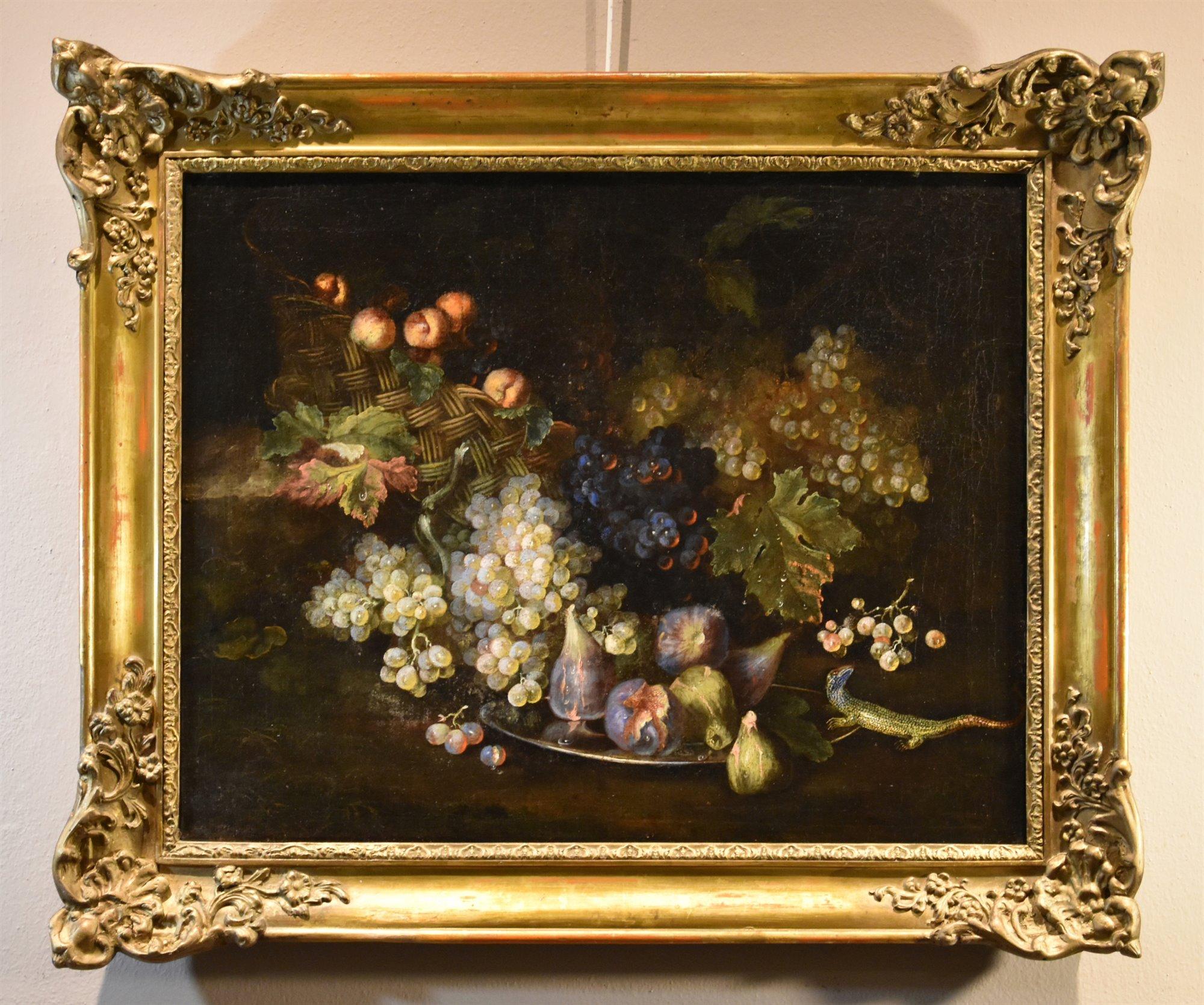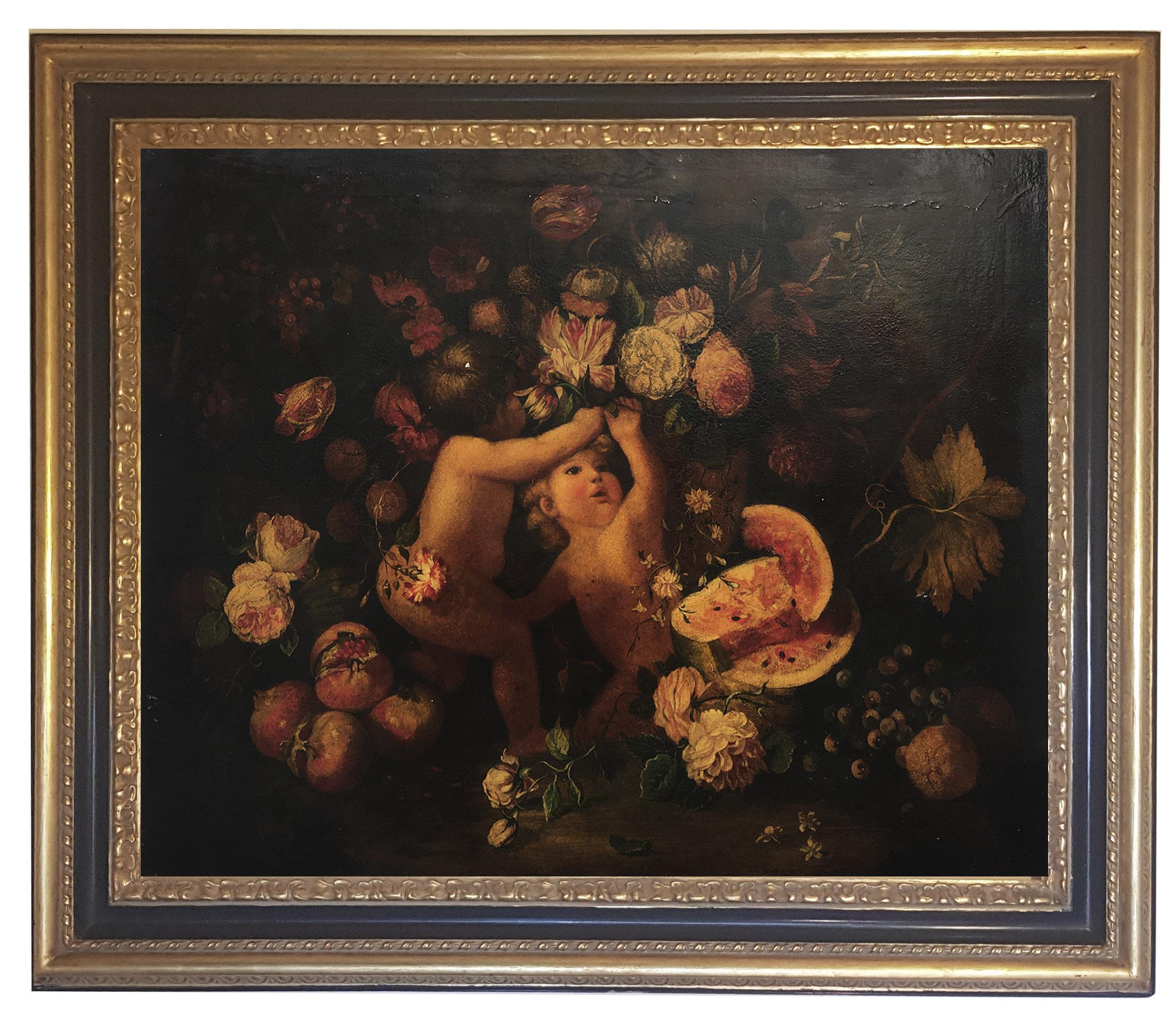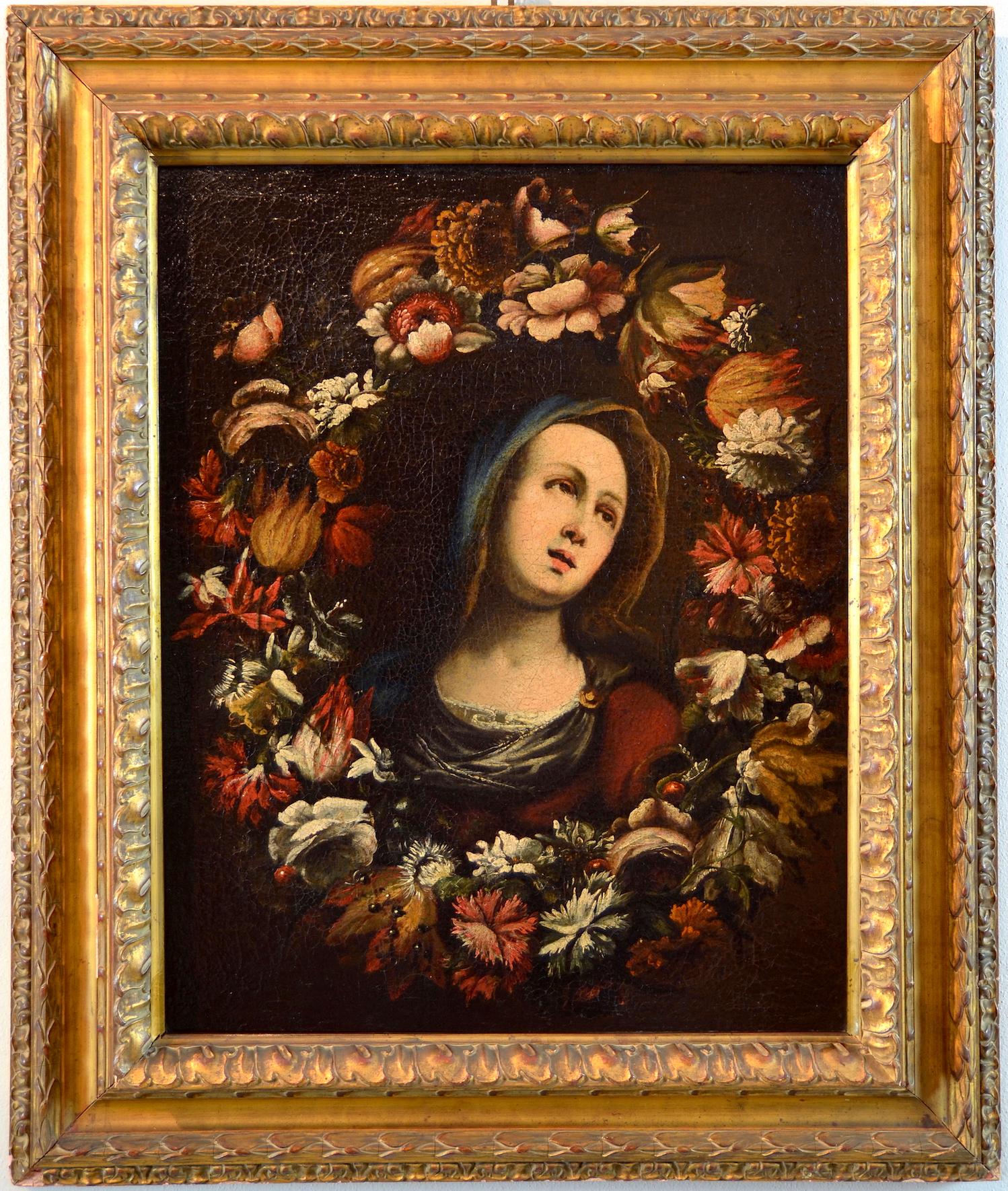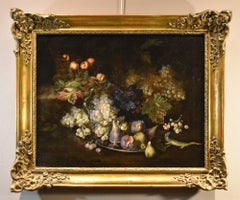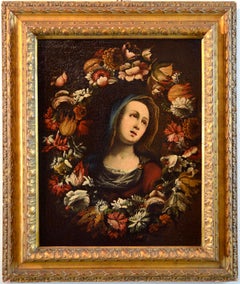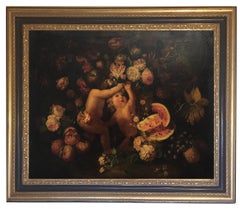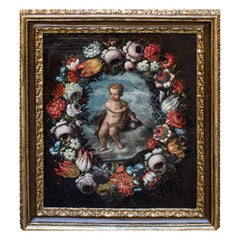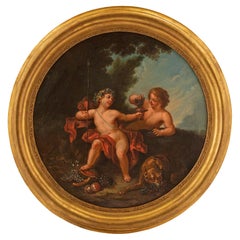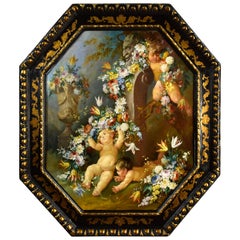Items Similar to Angels Flower Garzi Paint Oil on canvas Old master 17/18th Century Italian Art
Want more images or videos?
Request additional images or videos from the seller
1 of 22
Angels Flower Garzi Paint Oil on canvas Old master 17/18th Century Italian Art1680-1720
1680-1720
$14,874.54
$18,593.1720% Off
£11,014.51
£13,768.1320% Off
€12,480
€15,60020% Off
CA$20,454.72
CA$25,568.4020% Off
A$22,750.90
A$28,438.6320% Off
CHF 11,907.34
CHF 14,884.1720% Off
MX$277,486
MX$346,857.5020% Off
NOK 149,620
NOK 187,025.0120% Off
SEK 140,736.93
SEK 175,921.1620% Off
DKK 95,014.09
DKK 118,767.6120% Off
About the Item
Roman school of the early 18th century
Luigi Garzi (Pistoia 1638– Rome1721) attributed
Still life of fruit supported by three angels
Oil on oval canvas
116 x 91 cm., Framed 140 x 119 cm.
Authentication on a photograph by Prof Giancarlo Sestieri, who attributes the work to the sphere of Luigi Garzi
This magnificent canvas, depicting a sumptuous composition of fruit supported by three prosperous winged cherubs, from which comes a parchment bearing the Latin expression "Amor est vitae essentia", is to be placed in the production of a Roman author active between the second half of XVII century and the first of the following century.
The iconography that sees represented cherubs with fruit or flowers is frequent in the Baroque period, especially in the Roman area, starting from the 1600s, with that particular depictional tendency aimed at illusionistic and frivolous images, to a type of paintings or frescoes of strong value decorative, intended for the private context and depicting jubilation of cherubs, angels or cherubs, and of which our canvas represents a perfect example.
We can recall, among the most illustrious iconographic precedents, the elegant mirrors painted by Mario Nuzzi and Carlo Maratta that adorn the hall of Palazzo Colonna in Rome, and again the canvas preserved in the Rouen museum and the similar ones in Palazzo Chigi in Ariccia, with the collaboration for the figurative parts of Filippo Lauri.
The commercial and furnishing success of similar works is also testified by authors such as Guglielmo Cortese known as Borgognone (1628 - 1679), Franz Werner Von Tamm (1658 - 1724), Giovan Battista Gaulli (1639 - 1709), Giovanni Paolo Castelli known as Spadino (Rome 1650 - 1740) and the aforementioned Carlo Maratta (1625 - 1713)
The work, studied by Giancarlo Sestieri, was brought closer to the sphere of the eclectic Pistoian painter Luigi Garzi, one of the protagonists of Roman painting in the decades of transition between the seventeenth and eighteenth centuries. In our painting we can find the typical elements of his painting: the soft and delicately chiaroscuro light, the sculptural classicism of the figures as well as the stupendous luministic and chromatic effects.
Luigi Garzi's training and artistic activity took place in the Eternal City and he was in effect a Roman artist. He moved to Rome from Pistoia, his hometown at a very young age, and joined the atelier of Andrea Sacchi, who directed his studies towards classicism, comparing himself with the works of Raphael, Domenichino and Nicolas Poussin, but also with the Emilian one. , with particular attention to the school of Guido Reni.
But the Emilian examples were undoubtedly preceded, particularly by Giovani Lanfranco, who modeled his taste and style, together with a modulated cortonism, while those pre-eighteenth-century sensibilities are due to the lesson of Carlo Maratta.
However, there is no doubt that the painter oriented his personality without ever bowing to imitation, reaching a refined elegance and autonomy of language, as the canvas in question clearly demonstrates in which the different influences find a refined amalgamation in perfect harmony with the baroque evolution between the seventeenth and eighteenth centuries, indicating a dating to its earliest maturity.
These attitudes led the painter to obtain awards and prestigious commissions as soon as possible, such as the frescoes of Palazzo Borghese and San Carlo al Corso, where the memories of Domenichino and Reni emerge, up to the dome of the Cybo Chapel in Santa Maria del Popolo. Returning to the work, we can then assume a mature chronological position, due to the peculiar drafting, which is attested to by brushstrokes in enamelled shades and a heartfelt classicism.
The painting is in excellent condition, with a beautiful antique frame.
The work is accompanied by a certificate of photographic authenticity in accordance with the law.
We take care and organize the transport of the purchased works, both for Italy and abroad, through professional and insured carriers. For any additional information, please do not hesitate to contact us.
- Attributed to:Luigi Garzi (Pistoia 1638– Rome1721) (1638 - 1721, Italian)
- Creation Year:1680-1720
- Dimensions:Height: 55.12 in (140 cm)Width: 46.86 in (119 cm)
- Medium:
- Movement & Style:
- Period:Late 17th Century
- Condition:
- Gallery Location:Riva del Garda, IT
- Reference Number:1stDibs: LU98819352142
About the Seller
4.9
Platinum Seller
Premium sellers with a 4.7+ rating and 24-hour response times
Established in 2017
1stDibs seller since 2018
257 sales on 1stDibs
Typical response time: <1 hour
- ShippingRetrieving quote...Shipping from: Riva del Garda, Italy
- Return Policy
Authenticity Guarantee
In the unlikely event there’s an issue with an item’s authenticity, contact us within 1 year for a full refund. DetailsMoney-Back Guarantee
If your item is not as described, is damaged in transit, or does not arrive, contact us within 7 days for a full refund. Details24-Hour Cancellation
You have a 24-hour grace period in which to reconsider your purchase, with no questions asked.Vetted Professional Sellers
Our world-class sellers must adhere to strict standards for service and quality, maintaining the integrity of our listings.Price-Match Guarantee
If you find that a seller listed the same item for a lower price elsewhere, we’ll match it.Trusted Global Delivery
Our best-in-class carrier network provides specialized shipping options worldwide, including custom delivery.More From This Seller
View AllAngels Floral Garland Maratta Paint Oil on table Old master 17th Century Italian
Located in Riva del Garda, IT
Pair of angels with floral garland and cartouche with family motto 'Pulchriora latent'
Workshop of Carlo Maratta (Camerano, 1625 - Rome, 1713)
Dated on parchment, right: 1697
oil on the table (94 x 84cm./ in frame 105 x 95 cm.)
This magnificent composition, depicting two little fluttering cupids intent on holding up a garland of flowers, can be traced back, both for the stylistic characteristics and for the compositional taste, to a master active in the fervid seventeenth-century Baroque Rome.
One of the two cupids is about to grab the bow of the garland with his head facing downwards, while with the other hand he shows a parchment which bears, in addition to the date of execution, the Latin expression "Pulchriora latent" ("The the most beautiful things...
Category
17th Century Old Masters Paintings
Materials
Oil
$9,792 Sale Price
25% Off
Flowers Paint Oil on canvas Old master 17th Century Italy Still-life Art
Located in Riva del Garda, IT
Master of the Grotesque Vase (active in Rome and Naples in the first quarter of the 17th century)
Still life of flowers in a classic vase
oil on canvas
66 x 51 cm, In frame cm. 82 x...
Category
17th Century Old Masters Paintings
Materials
Oil
$8,304 Sale Price
20% Off
Still-Life Flower Von Tamm 17/18th Century Paint Oil on canvas Old master Italy
Located in Riva del Garda, IT
Franz Werner Von Tamm known as Monsieur Daparait (Hamburg 1658-Vienna 1754) Attributed to
Still life of fruit with lizard
Oil on canvas,
58 x 74 cm.
Framed 76 x 92 cm.
This magnifi...
Category
Early 17th Century Old Masters Paintings
Materials
Oil
$8,569 Sale Price
20% Off
Flower Garland Virgin Paint Oil on canvas Old master 17th Century Italy
By Giovanni Stanchi
Located in Riva del Garda, IT
Giovanni Stanchi (Rome 1608 - 1675) or Niccolò Stanchi (Rome 1623 - 1690), workshop of
GARLAND OF FLOWERS WITH PORTRAIT OF THE VIRGIN
Rome, First half of the Seventeenth century
o...
Category
17th Century Old Masters Paintings
Materials
Oil
$5,541 Sale Price
20% Off
Flowers Still-life Scacciati 17th Century Paint Oil on canvas Old master
Located in Riva del Garda, IT
Andrea Scacciati (Florence 1642-1710)
Composition of flowers within embossed vase (1 of 3)
oil on canvas
130 x 90 cm
In antique frame 145 x 105 cm.
Work with expertise by Prof. Emi...
Category
17th Century Old Masters Paintings
Materials
Oil
$13,662 Sale Price
20% Off
Still-Life Flower Von Tamm 17/18th Century Paint Oil on canvas Old master Italy
Located in Riva del Garda, IT
Franz Werner Von Tamm known as Monsieur Daparait (Hamburg 1658-Vienna 1754) Attributed to
Still life of fruit with lizard
Oil on canvas,
58 x 74 cm.
Framed 76 x 92 cm.
This magnifi...
Category
Early 17th Century Old Masters Paintings
Materials
Oil
$8,569 Sale Price
20% Off
You May Also Like
CHERUBIM WITH FLOWERS- Italian School - Italian Figurative Oil painting
By Giulio Di Sotto
Located in Napoli, IT
Cherubim with flowers - Oil on canvas cm.80x100 by Giulio Di Sotto, Italy, 2002.
Gold leaf gilded wooden frame available on request
This wonderful oil on canvas represents two putti...
Category
Early 2000s Old Masters Portrait Paintings
Materials
Canvas, Oil
Oil on canvas Jesus child within garland of flowers 18th century
Located in Milan, IT
Lombard School, 17th century
Christ child with globe within garland of flowers
Oil on canvas, 72 x 61 cm
Framed 90, 5 x 80
The present painting, framed by a sumptuous antique fr...
Category
Antique 18th Century Paintings
Materials
Canvas
Italian 18th Century Neo-Classical Oil on Canvas Painting
Located in West Palm Beach, FL
An extremely charming Italian 18th century Neo-Classical oil on canvas painting. The circular painting retains its original giltwood frame with a beautiful mottled designs and finely...
Category
Antique 18th Century Italian Neoclassical Paintings
Materials
Canvas, Giltwood
19th Century, Italian Painting with Still Life with Cherubs
Located in IT
19th century Roman painter
Still life with cherubs, flower festoons and herma with faun
Measures: Oil on canvas, cm H 78 x W 95 without frame
Cm H 122.00 x W 106 x D 8 with frame.
The work, painted in oil on canvas, octagonal in shape, represents a nature with three putti or cupids playing with flower festoons in a wooded environment in which is placed a herma with faun and, on the left, a large neoclassical marble vase...
Category
Antique 19th Century Italian Baroque Paintings
Materials
Canvas
17th Century by Il Padovanino Pair of putti Oil on canvas
By Il Padovanino
Located in Milano, Lombardia
Alessandro Leone Varotari, detto il Padovanino (Padua, Italy, 1588 - Venice, Italy, 1649)
Title: Pair of putti
Medium: Oil on canvas
Dimensions: without frame 83 × 66 cm – with frame...
Category
17th Century Old Masters Figurative Paintings
Materials
Canvas, Oil
Painting Guardian Angel in Flower Garland 17th century
Located in Milan, IT
Oil on Canvas. Central Italian school of the 17th century.
According to iconographic tradition, the 'guardian angel is also depicted in this painting as a winged youth accompanying a...
Category
17th Century Other Art Style Figurative Paintings
Materials
Oil
More Ways To Browse
Antique Flower Art
Italian Baroque Art
Antique Oval Art
Old Master Flower Painting
Antique Enamel Painting
18th Century Flower Paintings
Italian Antique Angels
Nicolas Oil Paint
Antique Angel Paintings
Raphael Oil Paintings
17th And 18th Century Oil Paintings
Painting With Cherubs
Cherub Angel
Antique Santa Painting
Roman Baroque Painting
Seventeenth Century Paintings
Italy Drafting
Antique Cherub Painting
